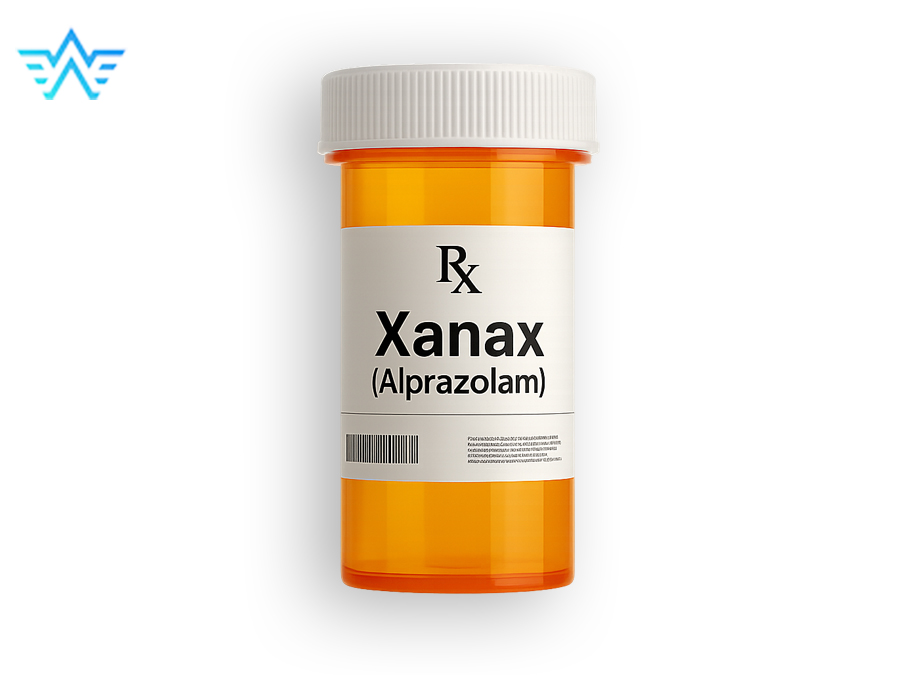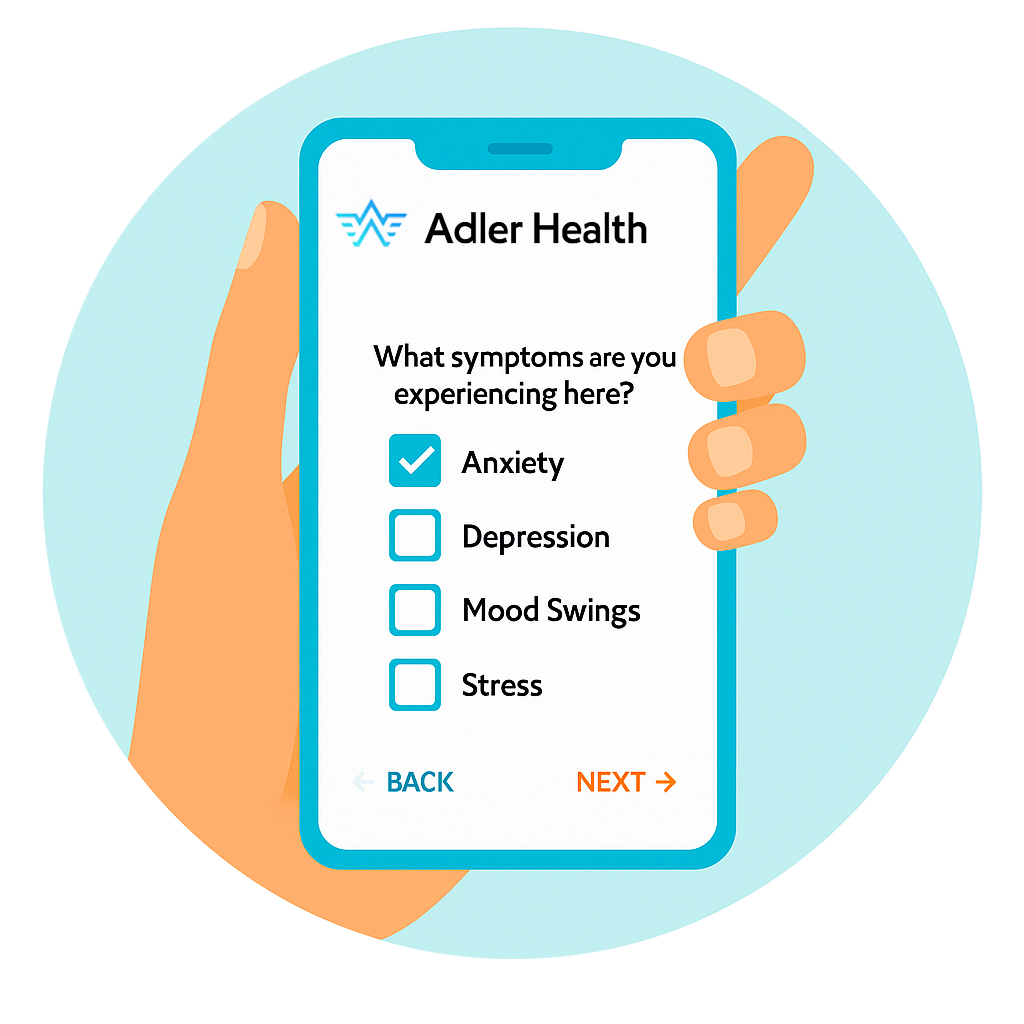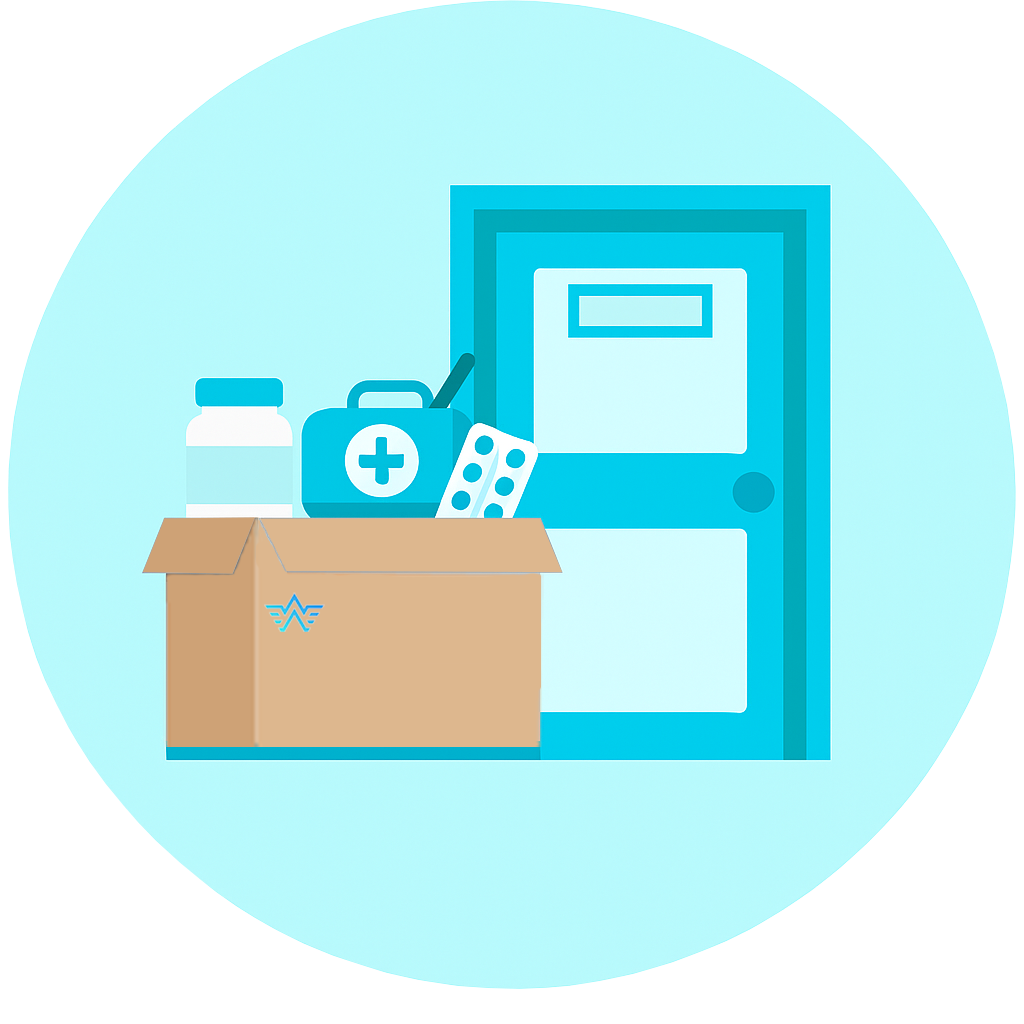Buy Alprazolam Online | Simple Free Consultation
Alprazolam (Xanax) can only be purchased with a doctor's prescription, and there are good reasons for this. The fact is that this medicine has a powerful effect on the central nervous system and, if taken uncontrolled or in the wrong dosage, can cause psychological and physical dependence. Before prescribing Alprazolam (Xanax), Adler Health experienced specialists conducts a thorough assessment of the patient's condition, analyzes the anamnesis, the presence of concomitant diseases, the current psycho-emotional state, as well as the risks of dependence. And only after that, an individual regimen is selected that corresponds to a specific patient. Thus, the presence of a prescription serves as a guarantee of rational, safe and effective use of the medication.

Starting at $3.00/ pill
Indications for Use
Although Alprazolam is primarily known as an anxiolytic (anti-anxiety medication), its spectrum of action is broader than it seems at first glance. Below are the main conditions for which doctors may prescribe Alprazolam (Xanax):
With GAD, a person constantly experiences non-specific, obsessive anxiety that is not associated with specific situations. This may be accompanied by insomnia, irritability, tremors, sweating, tachycardia. Alprazolam (Xanax) helps to break this vicious circle of anxious thoughts and relieve symptoms.
Another important indication – panic attacks. They can occur suddenly, with pronounced symptoms – rapid heartbeat, a feeling of suffocation, fear of death, dizziness… In such cases, the rapid action of Alprazolam (Xanax) can be a lifesaver.
Although Alprazolam (Xanax) is not an antidepressant, it may be used as part of combination therapy when a patient has severe anxiety or psychomotor agitation associated with a depressive state.
If you have phobias, including agoraphobia, fears associated with specific situations (flying, public speaking, etc.), this treatment is also suitable. Alprazolam (Xanax) will help you feel more in control.
Not so often, but in some cases, the medication can be used for restless leg syndrome or insomnia, particularly if these issues are linked to nervous tension. Due to its pronounced sedative properties, Alprazolam (Xanax) quickly relaxes muscles and promotes normal sleep.
In stressful situations, when the nervous system is subjected to prolonged stress, Alprazolam (Xanax) can provide the necessary support.
So, the main purpose of Alprazolam (Xanax) is to treat anxiety-related conditions. Its therapeutic effect alleviates the symptoms of panic, excessive worry, and depression, improves sleep quality, as well as normalizes psycho-emotional state in general.Just keep in mind that it’s crucial to follow the instructions when taking this medication. Otherwise, its improper use may cause unwanted problems such as addiction and side effects.
How It Works

Quick Health Check
Provide your medical history and describe your symptoms in a short online questionnaire. This helps us understand your situation thoroughly. It only takes 5–10 minutes.

Expert Review by Licensed Providers
Our board-certified mental health providers review your answers and build a treatment plan just for you. You’ll get updates in your patient dashboard.

Prescriptions Shipped to You
Should treatment be necessary, your medication is shipped promptly right to your door in plain, discreet packaging for your privacy.
Therapy, Treatment Services, Prescriptions at Adler Health
Using Alprazolam to Treat Anxiety
Main benefits:
- Fast action – the effect is felt within 30-60 minutes after oral administration, which is critically important in cases of acute anxiety.
- High efficiency – helps to quickly and reliably relieve symptoms of anxiety, panic and internal tension.
- Short-term use – prevents the escalation of anxiety-related crises; it’sa vital coping mechanism in stressful situations.
Drawbacks and things to remember:
- Addiction – especially with prolonged or uncontrolled use.
- Tolerance – requires an increase in dose to achieve the same effect.
- Side effects – may include drowsiness, fatigue, impaired concentration and memory.
- Contraindications and interactions – not recommended for certain medical conditions and in combination with other drugs that cause CNS depression.
- Withdrawal syndrome –severe symptoms may occur with abrupt cessation.
- Overdose risk, particularly when combined with alcohol or other depressants.
Thus, Alprazolam (Xanax) is a powerful remedy for anxiety disorders, panic attacks, and symptoms of chronic stress. It is very effective when used short-term under the doctor’s supervision. However, despite all its advantages, this drug requires a cautious and strictly individual approach. Abuse or failure to follow recommendations can lead to addiction and other serious consequences. Only a doctor can objectively assess the appropriateness of its use, safe dosage, and duration of treatment.
Who Should Avoid Alprazolam
Like any potent medication, Alprazolam (Xanax) has a number of strict contraindications. The use of this medication should always be based on a thorough medical assessment, since in some cases it can lead to serious complications.
One of the most obvious contraindications is the presence of an allergic reaction to Alprazolam itself or additional substances included in the tablets. Even if the allergy does not cause an immediate threat to life, the symptoms can be extremely unpleasant and dangerous:
- skin rash;
- itching;
- swelling of the face, lips, tongue;
- difficulty breathing;
- in rare cases – anaphylactic shock.
If the patient has previously experienced any allergic reaction to benzodiazepines or similar medications, Alprazolam (Xanax) is strictly prohibited.
Alprazolam (Xanax) is metabolized in the liver and leaves the body through the kidneys. In severe disorders of these organs (for example, cirrhosis, hepatitis, chronic renal failure), the metabolism of the medication can slow down significantly. This leads to the accumulation of the active substance in the body, increasing the risk of:
- toxic poisoning;
- increased side effects;
- central nervous system depression.
For such patients, the dosage should be minimal or the medication should be completely excluded, especially if there are alternative methods of therapy.
Although Alprazolam (Xanax) is used for anxiety disorders, it is not suitable for patients with psychosis, manic phases of bipolar disorder, schizophrenia, and other severe mental pathologies. Why? In some cases, the medication can increase anxiety or paranoia. An inadequate reaction is possible – aggression, irritability, agitation. In patients with an unstable psyche, Alprazolam (Xanax) may distort perception of reality or cause paradoxical effects.
Using the medication in such situations can cause more harm than benefit.
Alprazolam (Xanax) is sometimes prescribed for depression with an anxiety component. But the medicine is contraindicated for severe depression without pronounced anxiety. It can:
- exacerbate the feeling of depression;
- cause apathy, lethargy;
- in rare cases, provoke suicidal thoughts or behavior.
The use of Alprazolam (Xanax) for depressive disorders should only be carried out as part of complex therapy, with mandatory supervision of a psychiatrist. Otherwise, it may not only fail to help, but also worsen the mental state.
Benzodiazepines, including Alprazolam (Xanax), have a pronounced sedative and relaxing effect, which can depress the respiratory center. Taking the medication is especially dangerous for patients with obstructive sleep apnea syndrome, chronic obstructive pulmonary diseases (COPD), bronchial asthma.
In these people, breathing may slow down or stop, especially at night. Therefore, prescribing Alprazolam (Xanax) to such patients requires extreme caution.
Alprazolam (Xanax) is not recommended for use during pregnancy, especially in the first trimester, due to the potential risk of negative effects on the developing fetus. In addition, Alprazolam is prohibited during breastfeeding because it penetrates breast milk.
Doctors usually prescribe alternative, safer medications to treat anxiety in women during pregnancy and the lactation period.
For patients with a history of alcohol/substance addiction, using Alprazolam (Xanax) may result in becoming dependent. In this situation, the likelihood of medication misuse rises, potentially leading to severe health outcomes. This explains why people susceptible to addiction have to refrain from this medication.
Thus, before prescribing Alprazolam (Xanax) to patients, the doctor must carefully assess all possible risks. Each case requires a personalized approach, and only a medical expert, considering the patient's medical history and health status, can decide on treatment appropriateness.
Mechanism of Action
To understand exactly how Alprazolam (Xanax) works, we need to delve a little deeper into brain chemistry. Our behavior, mood, and anxiety levels are largely dependent on neurotransmitters, the chemicals that neurons use to “communicate” with each other. One of the most important of these neurotransmitters is GABA (gamma-aminobutyric acid).
GABA acts as a “brake” in the brain — it reduces the activity of nerve cells, helping us to relax, calm down, and fall asleep. Alprazolam (Xanax) enhances the effects of GABA by binding to certain receptors in the brain (GABA-A receptors) and making it work more efficiently. This leads to reduced anxiety and an overall sense of calm.
In addition to its pronounced anxiolytic effect, Alprazolam (Xanax) helps improve sleep quality, which is especially important for people suffering from insomnia due to anxiety. The drug helps patients fall asleep faster, makes sleep deeper and more continuous, eliminating nighttime awakenings caused by internal stress or panic.
What’s more, Alprazolam (Xanax) has pronounced muscle relaxant properties – it relaxes skeletal muscles and relieves muscle tension. This is useful for conditions accompanied by spasms or a feeling of “tightness” in the body, which often accompanies chronic stress and anxiety disorders.
Due to its impact on neural excitability, the drug also reduces the intensity of panic attacks: aids in managing symptoms such as palpitations, shortness of breath, dizziness, and a feeling of losing control. Emotional stability increases, which helps a person react more calmly to stressful situations.
It is important to note another advantage: Alprazolam (Xanax) has a rapid onset of action compared to other benzodiazepines. Within 30-60 minutes of taking it, most patients experience a noticeable improvement in their condition: anxiety goes away, a feeling of relief appears, muscle and mental tension weakens.This is why the medicine is often used to relieve acute attacks of anxiety or panic, as well as in situations where a person needs to quickly regain emotional balance – for example, before an important event, a flight or a public performance.
How to Take Correctly?
Getting the right dosageis key to achieving therapeutic effects and minimizing potential risks. Everything depends on the patient’s specific condition and how serious it is.
Most people start with 0.25-0.5 mg, taken 2-3 times a day. After that, the doctor may suggest increasing the dose based on how the body responds. Just remember, it's risky to go over the recommended dosage without talking to a physician first.
When prescribing Alprazolam (Xanax), doctors take into account the patient’s individual characteristics, including age, health status, and the presence of chronic diseases. For example, older people or patients with liver or kidney disease may need lower doses, since their bodies process the drug more slowly.
Besides, treatment requires regular monitoring. Your doctor may periodically adjust the dosage to ensure the best results and prevent negative reactions.
Never try to adjust the dose yourself, even if you feel better. Also, don’t stop taking the medication abruptly, as this may worsen your condition or cause withdrawal syndrome like increased anxiety, insomnia, and other unpleasant symptoms. Treatment cessation should be gradual and only after consulting a healthcare provider.
Alprazolam History
Brief history:
- Alprazolam (Xanax) hit the market back in the 1960s when researchers were searching for safer options than barbiturates, which had some pretty nasty side effects and a big risk of addiction.
- In 1971, Upjohn (later part of the pharmaceutical giant Pfizer) began developing Alprazolam.
- In 1981,this medicine was officially approved by the US Food and Drug Administration (FDA) for medical use.
Since its introduction, the medication has quickly gained popularity among psychiatrists due to its effectiveness and speed of action. Alprazolam (Xanax) has become especially popular in situations where anxiety develops suddenly and requires rapid pharmacological intervention.
Right from the start, this medicine wasn't just used for mental health issues. Therapists and cardiologists began prescribing it too for somatic diseases aggravated by stress – such as insomnia, headaches, rapid heartbeat that has no organic cause.
Side Effects
Most people tolerate the medication without major complications, but it’s still important to be aware of the possible risks.
Drowsiness is the most common side effect. This is especially true at the beginning of treatment, when the body gets used to the active substance. In some cases, headaches, dizziness, or feeling weak may develop. This is, of course, unpleasant, but usually such symptoms go away after a few days of use.
Additionally, Alprazolam (Xanax) can cause problems with coordination, which increases the risk of falls and injuries, especially in older adults. Digestive problems such as nausea, constipation, or dry mouth may also occur. More serious side effects include:
- depression;
- aggressive behavior;
- respiratory depression (slowed breathing);
- allergic reactions such as rash, itching, swelling, or difficulty breathing;
- addiction with prolonged use;
- withdrawal symptoms upon discontinuation, such as seizures, restlessness, or tremors.
It's important to report any unusual or severe side effects to a healthcare professional immediately.
Long-Term Use
Although Alprazolam (Xanax) is highly effective in treating anxiety disorders, its long-term use can cause serious side effects, primarily addiction. Usually, the course of treatment is limited to 4 weeks. If you use the drug longer, especially without medical supervision, the risk of addiction increases.
Over time, tolerance may develop – that is, the body gets used to the drug, and its previous dose no longer produces the desired effect. As a result, the patient begins to increase the dosage on their own, which aggravates addiction and increases the risk of overdose.
Stopping the drug after long-term use should be gradual and under the medical supervision. Sudden withdrawal can cause withdrawal symptoms, including symptoms such as:
- increased anxiety;
- insomnia;
- irritability;
- headaches;
- tremors;
- in severe cases – seizures and panic attacks.
Long-term use of Alprazolam (Xanax) can also negatively affect cognitive functions. Some patients complain of memory impairment, concentration, and learning ability. This is due to the drug's depressant effect on the central nervous system and requires constant specialist monitoring.
In general, when using Alprazolam (Xanax) for an extended period, it is essential to regularly consult with a physician, watch for potential side effects, and adjust treatment if necessary.
Interactions
Alprazolam (Xanax) has the property of enhancing the action of central depressants. These include benzodiazepines, barbiturates, opioids, some antidepressants, and alcoholic beverages. Their combined use can seriously slow down your nervous system, resulting in:
- drowsiness;
- difficulty breathing;
- decreased blood pressure;
- and even life-threatening conditions.
Combining Alprazolam (Xanax) with opioids is especially dangerous, as it increases the risk of respiratory depression. Also, when interacting with antiepileptic drugs, such as Carbamazepine, the level of Alprazolam (Xanax) in the blood may change. Some drugs speed up its breakdown, reducing effectiveness, while others, on the contrary, increase its level, which can cause side effects.
Antifungal drugs (Ketoconazole, Itraconazole, etc.) can slow down the metabolism of Alprazolam (Xanax) in the liver, which will lead to an increase in its concentration in the body. In such cases, doctors always carefully monitor the dosage to avoid side effects such as drowsiness or problems with coordination.
Let Adler Health Serve You!
If you or a loved one is struggling with a mental health disorder or a co-occurring disorder, Adler Health is here for you. Contact us today to learn more about our mental health treatment programs and other resources.




